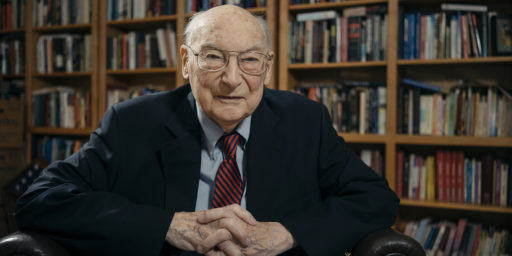Democracy and Foreign Policy
Josh Marshall advances the thesis that “democratization as a moral or strategic goal simply doesn’t figure into the White House’s plans.” He does so via a recitation of evidence that, in fact, the administration has failed to overthrow 189 non-democratic states and has allied with some pretty sorry characters in order to prosecute the war on terrorists. (A position with which Marshall may have some particular quibbles but largely concedes is the correct policy in general.)
Remember, the key here is the advancement of democracy not only as a good thing, a humanitarian gesture, a form of state-imposed meta-philanthropy, but as a way of advancing American national security. But for that to mean anything one would have to point to cases where we, or in this case, the administration made short-term geopolitical sacrifices to advance our longterm interest in democratization.
The problem with this argument is that, as far as I can recall, the Administration has never claimed that advancing democracy per se was the overarching goal of its foreign policy. Further, the fact that they haven’t intentionally undermined their short term war aims in order to do so doesn’t address the thesis which, if I remember correctly, was “democratization as a moral or strategic goal simply doesn’t figure into the White House’s plans.”
To the extent that there is a universal law of international relations, it is that democratic states don’t go to war against one another. Further, Western-style democracy–with freedom of worship and expression as cornerstones–is antithetical to Wahhabist Islamism, which requires absolute conformity to fundamentalist sharia. Virtually all foreign policy experts agree that democratization (again, as opposed to merely “one man, one vote, one time”) in the Middle East would be a very good thing. The debate is over how one should get there, whether getting there is possible at all, and so forth.
Bush and the neoconservatives clearly have a vision of the world that involves the spread of Western values. I share the goal but am much more skeptical of its achievability. Certainly, however, it’s difficult to argue that it’s not a “moral or strategic goal” of the administration. The mere fact that other goals–say, the prevention of a catastrophic attack on American cities–take precedence doesn’t make it untrue.






Of course, the two cases where the Bush administration’s advocates would beg to differ would be those two cases I chose to set aside at the outset: Afghanistan and Iraq. Yet, I think that at any time in recent history any American government would have attempted to put in place a government that is at least nominally democratic in any state it overthrew. And the case of sorry inattention to Afghanistan makes a very good argument for the proposition that actual democratization is very lower on the list of the administration’s priorities
This is called having your cake and eating it too. As well, last I checked, we still had a sizable troop presence in Afghanistan – hardly “sorry inattention.”
Marshall also neglects the recent pressure on Cuba via stricter embargo rules.
The assertion that we have not made “short-term geopolitical sacrifices to advance our longterm interest in democratization” is likewise a nicely crafted bit of fluff. The fact that the U.S. now has substantial troop presences in Iraq and Afghanistan represents incredible short-term geopolitical sacrifice for a long-term goal of democracy in the middle east (can you say “unilateral”? I knew you could).
There are 189 non-democractic states in the world? I’m no IR person, but that number sounds high… as in, I’m pretty sure there are only around 200 independent countries in the world to begin with.
Chris, I was formerly an IR person, and if I recall the Freedom House data(ah, I miss coding), there are around 120 democracies in the world, and several dozen countries making transition. The number of stagnant non-democracies is close to 50, and the core of these is in the Arab world.
To be fair, Marshall is trying to be cute by mentioning the 189 member-nations of the UN we “haven’t overthrown,” and Doc J is being cute by calling these 189 non-democracies.